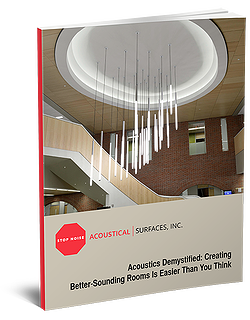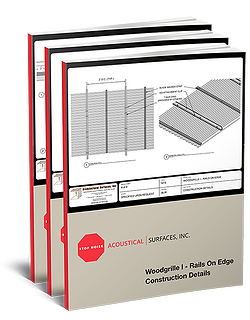Eco-friendly Soundproofing: Recycled Cotton Panels
In today’s world, sustainability is more than just a phrase; it is a critical factor that may affect almost every part of our daily lives.
With governments around the globe pledging to pursue net-zero goals, the construction industry—which is widely recognized as one of the leading producers of greenhouse gas (GHG) emissions—has entered regulators’ sights.1 This focus on environmental stewardship has spurred a wave of legislation and regulation, transforming a practice that was once merely recommended into something that may soon be required.
The pressure to meet environmental standards within construction is intensifying, even in specialized areas like soundproofing. It is no longer sufficient to strike a balance between aesthetics and acoustics. Builders, architects, and consumers must now consider the environmental impact of the materials they use..
In response to the growing demand for eco-friendly acoustic treatment, soundproofing tips that use recycled cotton panels have emerged as a leading candidate capable of satisfying aesthetic, acoustic, and eco-conscious requirements.
What Are Acoustic Panels?
The general purpose of acoustical panels is to provide sound absorption, and diffusion to a lesser degree. These acoustical products—made from soft, squishy, porous materials—can soak up sound waves, preventing them from creating reverb or flutter echoes, and break up sound waves to disperse sound energy evenly throughout the space.
Naturally, acoustic panels play a crucial role in sound control, and their shapes and the materials used in their construction will significantly influence their effectiveness and applications. Common materials for acoustic panels include:
- Foam
- Mineral Wool
- Fiberglass
- Polyester
- Wood
While these materials have proven effective in controlling sound, the demand for environmentally responsible options has caused recycled cotton panels to skyrocket in popularity.
What Are Recycled Cotton Panels?
Made from repurposed cotton fibers, recycled cotton panels are crafted from materials that would otherwise contribute to waste. This typically comes from two primary sources:
- Pre-consumer waste – Industrial remnants from the manufacturing process, including cotton cuttings and excess materials that have not yet reached the consumer.
- Post-consumer cotton – Discarded clothing items and other cotton products that consumers no longer need or want.
During recycling, cotton waste is broken into fibers by stripping machines, then cleaned and mixed through carding before being spun into new yarn and textiles.
From there, the cotton is cleaned, sorted, and ultimately transformed into dense, fibrous panels that maintain the sound-absorbing material qualities of traditional acoustical material.
Simply put, eco-friendly soundproofing represents a change toward a more mindful and responsible approach to resource management, transforming what was formerly deemed trash into a viable instrument for sound control.
Benefits of Recycled Cotton Panels
Why are more builders opting for recycled cotton panels in their soundproofing plans? Popular advantages include:
- Acoustic performance – The most compelling benefit of eco-friendly soundproofing material is their excellent acoustic performance. They effectively absorb sound waves and provide diffusion to create a pleasing and controlled sound environment. Their performance is on par with, if not superior to, traditional soundproofing materials.
- Sustainable and circular production – The production of recycled cotton panels supports a circular economy where resources are reused and repurposed, rather than left to waste. By utilizing waste from both pre-consumer and post-consumer sources, the process reduces both upstream and downstream emissions outputs while promoting responsible resource management.
- Class A fire rated – Despite being made of cotton, recycled cotton panels undergo a special fire-retardant treatment process to ensure a Class A fire rating that meets strict fire safety standards in residential and commercial settings.
- High-quality recycled fiber – The recycling process involves the meticulous selection and treatment of cotton fibers to ensure that the acoustic panel is of the highest quality. This attention to detail keeps the cotton’s inherent characteristics, resulting in a product that works well in a variety of applications.
- Natural material – Composed of organic cotton fibers, wood fiber, recycled cotton panels are a natural, non-toxic option. Natural materials provide an eco friendly alternative to a synthetic material.
- Durability – Recycled cotton panels are designed to last. Their sturdy design guarantees that they will resist regular wear and tear while keeping their acoustic qualities.
- Economical – Recycled cotton panels are often more budget-friendly than other soundproofing material types. Also, because they’re durable, they don’t need to be replaced as frequently as some other acoustic materials.
Acoustical Surfaces: Your Partner in Eco-Friendly Soundproofing
If you want green acoustic products, recycled cotton acoustic panels embody the principle of sustainability without sacrificing performance. And, at Acoustical Surfaces, we offer several eco-friendly soundproofing and acoustic products, including:
- UltraTouch™ Eco-Friendly Denim Insulation
- Echo Eliminator™ Acoustic Panels
- Bonded Acoustical Cotton (B.A.C.) Eggcrate Acoustical Panel
Want to learn more about soundproofing for green building applications?
Contact the sound professionals at Acoustical Surfaces today.
Sources:
- IOP Science. Greenhouse Gas Emissions of Global Construction Industries. https://iopscience.iop.org/article/10.1088/1757-899X/1218/1/012047
- Recycled cotton, naturally circular. https://textilsantanderina.com/textile-solutions/recycled-cotton/




